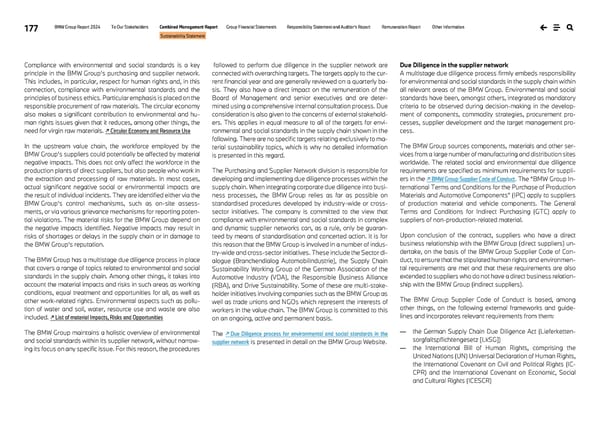177 BMW Group Report 2024 To Our Stakeholders Combined Management Report Group Financial Statements Responsibility Statement and Auditor’s Report Remuneration Report Other Information Sustainability Statement Compliance with environmental and social standards is a key principle in the BMW Group’s purchasing and supplier network. This includes, in particular, respect for human rights and, in this connection, compliance with environmental standards and the principles of business ethics. Particular emphasis is placed on the responsible procurement of raw materials. The circular economy also makes a significant contribution to environmental and hu- man rights issues given that it reduces, among other things, the need for virgin raw materials. ↗ Circular Economy and Resource Use In the upstream value chain, the workforce employed by the BMW Group’s suppliers could potentially be affected by material negative impacts. This does not only affect the workforce in the production plants of direct suppliers, but also people who work in the extraction and processing of raw materials. In most cases, actual significant negative social or environmental impacts are the result of individual incidents. They are identified either via the BMW Group’s control mechanisms, such as on-site assess- ments, or via various grievance mechanisms for reporting poten- tial violations. The material risks for the BMW Group depend on the negative impacts identified. Negative impacts may result in risks of shortages or delays in the supply chain or in damage to the BMW Group’s reputation. The BMW Group has a multistage due diligence process in place that covers a range of topics related to environmental and social standards in the supply chain. Among other things, it takes into account the material impacts and risks in such areas as working conditions, equal treatment and opportunities for all, as well as other work-related rights. Environmental aspects such as pollu- tion of water and soil, water, resource use and waste are also included. ↗ List of material Impacts, Risks and Opportunities The BMW Group maintains a holistic overview of environmental and social standards within its supplier network, without narrow- ing its focus on any specific issue. For this reason, the procedures followed to perform due diligence in the supplier network are connected with overarching targets. The targets apply to the cur- rent financial year and are generally reviewed on a quarterly ba- sis. They also have a direct impact on the remuneration of the Board of Management and senior executives and are deter- mined using a comprehensive internal consultation process. Due consideration is also given to the concerns of external stakehold- ers. This applies in equal measure to all of the targets for envi- ronmental and social standards in the supply chain shown in the following. There are no specific targets relating exclusively to ma- terial sustainability topics, which is why no detailed information is presented in this regard. The Purchasing and Supplier Network division is responsible for developing and implementing due diligence processes within the supply chain. When integrating corporate due diligence into busi- ness processes, the BMW Group relies as far as possible on standardised procedures developed by industry-wide or cross- sector initiatives. The company is committed to the view that compliance with environmental and social standards in complex and dynamic supplier networks can, as a rule, only be guaran- teed by means of standardisation and concerted action. It is for this reason that the BMW Group is involved in a number of indus- try-wide and cross-sector initiatives. These include the Sector di- alogue (Branchendialog Automobilindustrie), the Supply Chain Sustainability Working Group of the German Association of the Automotive Industry (VDA), the Responsible Business Alliance (RBA), and Drive Sustainability. Some of these are multi-stake- holder initiatives involving companies such as the BMW Group as well as trade unions and NGOs which represent the interests of workers in the value chain. The BMW Group is committed to this on an ongoing, active and permanent basis. The ↗ Due Diligence process for environmental and social standards in the supplier network is presented in detail on the BMW Group Website. Due Diligence in the supplier network A multistage due diligence process firmly embeds responsibility for environmental and social standards in the supply chain within all relevant areas of the BMW Group. Environmental and social standards have been, amongst others, integrated as mandatory criteria to be observed during decision-making in the develop- ment of components, commodity strategies, procurement pro- cesses, supplier development and the target management pro- cess. The BMW Group sources components, materials and other ser- vices from a large number of manufacturing and distribution sites worldwide. The related social and environmental due diligence requirements are specified as minimum requirements for suppli- ers in the ↗ BMW Group Supplier Code of Conduct. The “BMW Group In- ternational Terms and Conditions for the Purchase of Production Materials and Automotive Components” (IPC) apply to suppliers of production material and vehicle components. The General Terms and Conditions for Indirect Purchasing (GTC) apply to suppliers of non-production-related material. Upon conclusion of the contract, suppliers who have a direct business relationship with the BMW Group (direct suppliers) un- dertake, on the basis of the BMW Group Supplier Code of Con- duct, to ensure that the stipulated human rights and environmen- tal requirements are met and that these requirements are also extended to suppliers who do not have a direct business relation- ship with the BMW Group (indirect suppliers). The BMW Group Supplier Code of Conduct is based, among other things, on the following external frameworks and guide- lines and incorporates relevant requirements from them: — the German Supply Chain Due Diligence Act (Lieferketten- sorgfaltspflichtengesetz [LkSG]) — the International Bill of Human Rights, comprising the United Nations (UN) Universal Declaration of Human Rights, the International Covenant on Civil and Political Rights (IC- CPR) and the International Covenant on Economic, Social and Cultural Rights (ICESCR)
 BMW Group Report 2024 Page 176 Page 178
BMW Group Report 2024 Page 176 Page 178